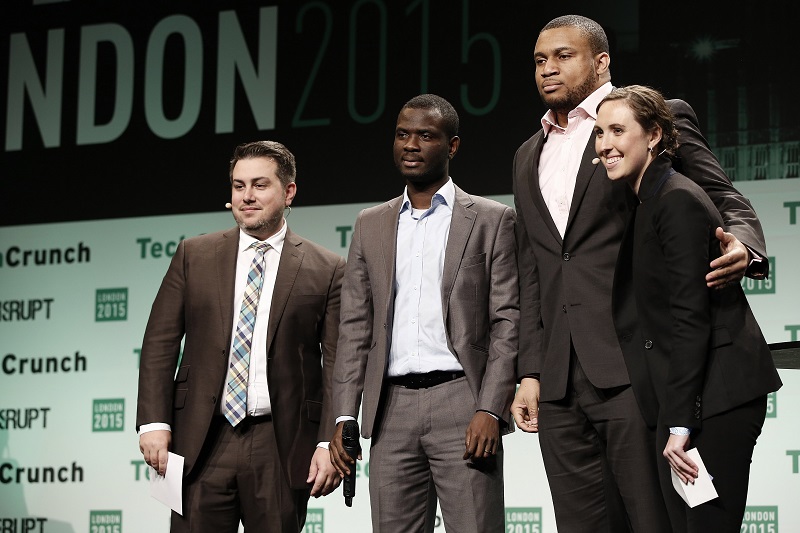It has been quite a year for Nigerian e-courier startup Metro Africa Express (MAX), which only formally launched in August of 2015.
Since then the startup, which was formed at the Massachusetts Institute of Technology (MIT), has been named runner-up at the TechCrunch Startup Battlefield event in London and named a “Top 12 Global Inclusive Growth Idea” by the World Economic Forum (WEF) and the Harvard Center for International Development.
It followed that up by becoming the first African team to gain admission into the Techstars startup accelerator programme in New York, raised a funding round of almost US$1 million in March, and last week completed the acquisition of another startup as it prepares to roll out its own food delivery service.
Quite a year. But what is all the fuss about. At its core, MAX is a delivery platform similar to the likes of WumDrop and Sendy. The hyper-local delivery platform provides ordering apps, payment processing and last-mile delivery support to retail businesses and mobile consumers.
Yet it also goes a step further. MAX guarantees 30-minute food delivery and three-hour package delivery on its cloud-based logistics platform, accepts online and offline payments, and simplifies navigation using its proprietary GPS addressing system.
These functionalities have made it popular in Lagos, where the startup currently operates. It supports over 750 retail businesses and has completed more than 25,000 deliveries in the city so far. This sizeable uptake has proven attractive to investors, too, with MAX raising US$960,000 in funding from institutional and angel investors in the United States (US) and Nigeria, including Techstars Ventures, Venture Garden Group and Locke Mountain Ventures.
With this backing, and the success it has seen so far, the startup is thinking big. Launches are planned in Abuja, Port Harcourt, Nairobi, Accra and Abidjan for next year, ahead of an Africa-wide rollout.
“MAX’s mission is to unlock hyperlocal retail across Africa, and operate in 50 African cities with a network of 20,000 drivers, delivering packages for one million businesses and 100 million users by 2020,” co-founder Adetayo Bamiduro told Disrupt Africa.
Things are moving so fast that MAX has even been able to acquire a startup launched three years before its own formation, in the Lagos-based Easyappetite. But as it plots expansion and prepares to roll out its own food delivery service, Bamiduro is keen to look back to the roots of the company.
MAX began started as an independent research project at MIT, with Bamiduro and co-founder Chinedu Azodoh heading to Lagos to look at last-mile delivery and consult for some of Africa’s biggest e-commerce companies.
“During this period, we experienced first-hand the critical challenges facing last-mile delivery in Africa,” Bamiduro said.
“We observed problems ranging from unpaved roads and difficult customer addresses to reckless motorcycle riding, low rider remuneration, zero usage of location intelligent apps and unscalable business models.”
The pair returned to MIT determined to fix last-mile delivery across Africa, and teamed up with other classmates to build a prototype solution. A number of awards later, with an accelerator programme and a funding round also behind it, MAX is preparing to go continent-wide. For Bamiduro, the possibilities are endless.
“Africa now has over 60 cities with up to one million inhabitants. Lagos, Cairo, Johannesburg and Kinshasa have more than 10 million inhabitants. By 2020, 50 per cent of Africa’s 1.4 billion people would live in cities. The inadequate existing urban transport and delivery infrastructure will come under intense stress and businesses will struggle to deliver goods and services to consumers at the last-mile,” he said.
“Distribution and last-mile delivery are two of Africa’s biggest development challenges. Despite rapid adoption of mobile technology, delivering goods and services at the last-mile remains a huge challenge. African cities are hard to navigate, paved roads are few and addresses are difficult to resolve. These problems make last-mile delivery and online retail nearly impossible.”
As a result, the average delivery time for online orders exceeds four days in Lagos. This is the problem MAX looks to solve with its platform and a high-speed delivery network.
With impressive results, so far at least. MAX, which operates a revenue-sharing model with its partner riders, has top-line revenue fast approaching the six-figure range. What remains to be seen is how it will fare as it begins expanding out of Lagos, and indeed Nigeria. But if the next year is anything like the last, it should be one hell of a ride.


